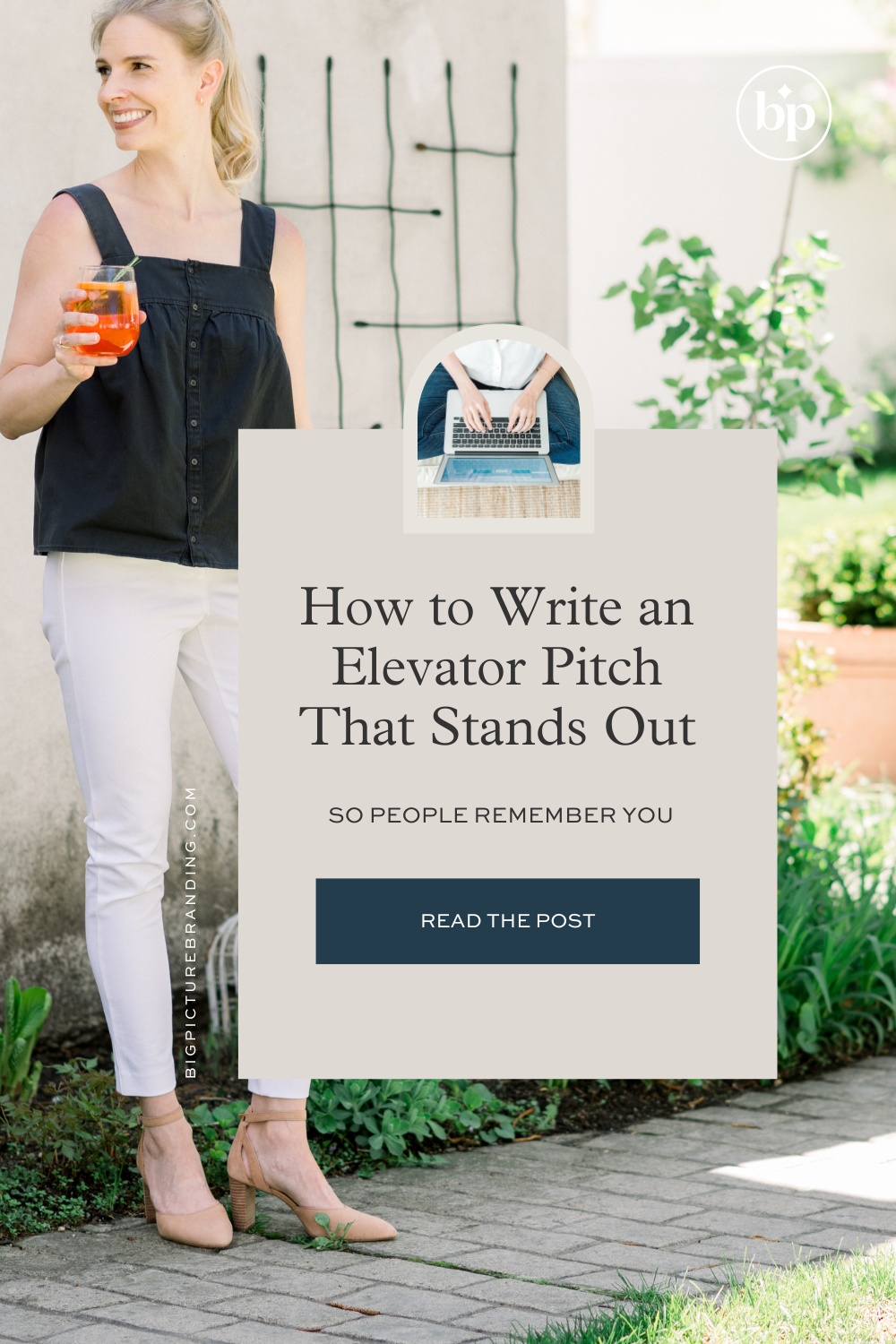Coaches, brand strategists, and copywriters alike hammer it into our clients and students that you’ve got to have your elevator pitch polished and ready to go at a moment’s notice.
And while, yes, you must be able to succinctly tell someone what you do and who it’s for, in the real world, your 1-line elevator pitch isn’t enough.
Truth be told, it wasn’t until I started guesting on fellow creative’s small business podcasts that I realized my pitch looked good on paper but was a total dead end IRL.
You’ve probably experienced that awkward silence (that seems to stretch on forever) after you’ve introduced yourself, right?
Real-World Scenario:
THEM: So, tell me Courtney – What do you do?
YOU: [Throws shoulders back – you’ve been waiting for this moment your whole life.] I’m a brand strategist and copywriter for purpose-driven online businesses.
THEM:
YOU: So…
THEM:
YOU: So, how about you? [Grabs nearby drink in an attempt to distract from the fact that you’re turning red and sweating profusely.]
The Problem:
Not only is your elevator pitch a snoozefest, but it also doesn’t open the door for more conversation.
And this kind of situation doesn’t just happen with people who aren’t familiar with the type of work you do. Even if it’s obvious what a copywriter, designer, wedding photographer, coach for [insert field here] does, people need you to put what you do into context so they can become interested in you.
They need you to give them the Cliff’s Notes version of your brand story and how it relates to *them*.
This will help them:
-
Connect with you
-
Remember you
-
Connect you with people they know (We love a good referral!)
-
Prompt them to get curious and ask more questions
Because not everyone you meet is going to be in the market for your services, but they probably know someone who is. If I had a dollar every time someone asked me if I knew any small biz accountants/content writers/social media marketers/VAs, I’d be rich.
6 Essential Questions To Make Your Elevator Pitch Stand Out
(and make people remember you.)
1) What’s something your competitors do that you dislike?
Example:
I find that a lot of brand and business strategists discount how necessary “purpose” is to develop a successful brand and how that helps with your messaging and copy.
2) Why does (your slice of) the world need your product or service?
Example:
In the world of metrics mayhem, SEO-hacking, and lots of “money-grab” funnel marketing, we have a lot of quantitative data on people, (where they shop, household income, media they consume) but not enough about the context of their problems and how we can solve them using a little bit of empathy. I work 1:1 with clients, but for creative entrepreneurs in the DIY or low-budget phase of their business, Big Picture Branding’s templates and products are developed to make purpose-driven brand strategy and copywriting that converts accessible to all.
3) How does your story make your service or product better?
Example:
I started my business in 2019 after a particularly difficult rebranding project for a tech company. I realized the reason we were struggling was that we had no vision or purpose. It was all about the bottom line, which made it impossible for employees and clients to feel a connection to something bigger and worth investing in. With this seed planted firmly in my head, I knew that one day I wanted to build a purpose-driven business and help others do the same.
4) How do you make your clients feel a part of something, happy, or loved?
Example:
It is AMAZING to watch my clients go from feeling like they have no voice or they have too many unorganized ideas, to suddenly seeing a clear brand snap into frame! The ah-ha moments create a sense of momentum and motivate people to take those next steps and grow their businesses in a way that feels aligned and good inside and out.
5) How does experiencing your brand, from the first point of contact to the last, make your clients feel?
Example:
Working with Big Picture is like laying in savasana pose at the end of a hot yoga class. You suddenly have this clarity about your business and offers that you never had before. All that mind-drama and noise is gone – and it required some sweat work to get there – but you can finally relax knowing the copy and messaging you’re putting out into the world feels good to you *and* will lead to booked clients and sales.
Put it all together…
Depending on the situation, you might pull from only one or two questions to address what your audience/networking acquaintance/dinner guest wants to know, but knowing your answer to all six questions means you’ll have a beefed-up (and interesting) elevator pitch in your back pocket.
SITUATION: Podcast Interview
THEM: It’s so great to meet you, Courtney. Tell us a little bit about your business.
YOU: I’m the founder of Big Picture Branding which provides brand strategy and copywriting for purpose-driven creatives.
I find that a lot of brand and business strategists discount how necessary “purpose” is to develop a successful brand and how that helps with your messaging and copy. In the world of metrics mayhem, SEO-hacking, and lots of “money-grab” funnel marketing, we have a lot of quantitative data on people, (where they shop, household income, media they consume) but not enough about the context of their problems and how we can solve them using a little bit of empathy. I work 1:1 with clients, but for creative entrepreneurs in the DIY or low-budget phase of their business, Big Picture Branding’s templates and products are developed to make purpose-driven brand strategy and copywriting that converts accessible to all.
Another reason I focus so much on building copy and messaging around your purpose is that after a particularly difficult rebranding project for a tech company, I realized the reason we were struggling was that we had no big-picture vision. It was all about the bottom line, which made it impossible for employees and clients to feel a connection to something bigger and worth investing in. With this seed planted firmly in my head, I knew that one day I wanted to build a purpose-driven business and help others do the same.
Even after being in business for almost four years now, it is AMAZING to watch my clients go from feeling like they have no voice or they have too many unorganized ideas, to suddenly seeing a clear brand snap into frame! The ah-ha moments create a sense of momentum and motivate people to take those next steps and grow their businesses in a way that feels aligned and good inside and out.
I like to think that working with Big Picture is like laying in savasana pose at the end of a hot yoga class. You suddenly have this clarity about your business and offers that you never had before. All that mind-drama and noise is gone – and it requires some sweat work to get there – but you can finally relax knowing the copy and messaging you’re putting out into the world feels good to you *and* will lead to booked clients and sales.
THEM: That sounds, AMAZING. So you mentioned DIY-ers – what do you think is the number one mistake business owners make when trying to write their own copy?…
[End Scene]
[Applause, Applause, Applause.]
What if you’re not clear on what you’re all about?
Your elevator pitch needs to take people on a memorable journey so you stick out from the crowd – which means you have to get super clear on the whats and whys behind your business first.
-
Your Business 101 + Elevator pitch
-
Audience
-
Vision
-
Values
-
Perception
-
Product & Services Evaluation
-
Client/Audience Experience
-
Name & Tagline
-
Content & Copy
-
Design & Style
-
Pricing Strategy
-
Reach & Promotion
-
THE BP “ABOUT PAGE PRIMER” {EXCLUSIVE}
-
TRELLO BRAND PLANNER TEMPLATE {EXCLUSIVE}
PIN IT TO SAVE FOR LATER


